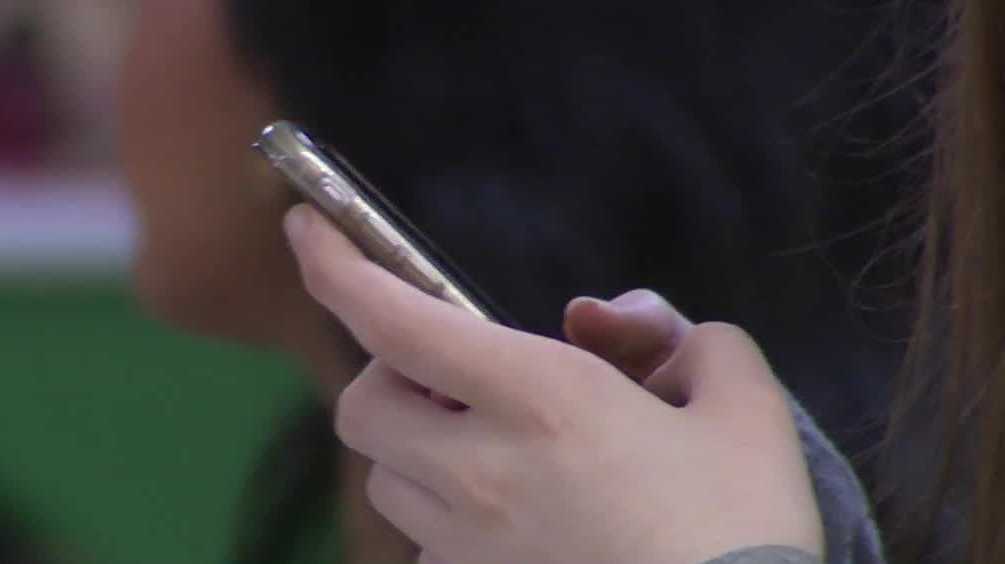
There’s a new call to action at Des Moines’ Hoover High School to improve mental health. The school will no longer allow students to use their cellphones, headphones or AirPods during the school day in the upcoming school year.Generation Z is more digitally connected than ever before. Most teenagers have access to smartphones and use social media for upwards of eight hours a day.”I feel like a lot of my mental issues were definitely amplified by the use of my phone because it provides distractions,” says Hoover senior Caden Walker. “When I am on my phone, I’m either just talking to my friends or loved ones. I scroll Instagram a lot.”School administrators worry their students’ sense of disconnect is impacting their well-being. This fall, Hoover is ditching digital distraction to improve mental health. It’s part of the “Hoover Mental Health Movement.””This isn’t a campaign against phones. This isn’t a campaign against social media,” explains associate principal Rob Randazzo. The longtime educator is spearheading the change after seeing the rising effect of anxiety and depression on his students’ conditions he says didn’t stem from the pandemic but exasperated by it. “The research is showing it was actually 2012 is where anxiety and depression in our youth went off the cliff,” says Randazzo. “That’s when the iPhone and Android was in most of our students’ hands with the App Store really up and running.”Under the Hoover Mental Health Movement, it will require a phone- and headphone-free environment during the 2024-2025 school year. Administrators are also encouraging parents and caregivers to wait to introduce cellphones to youth until 14-years-old. They also are encouraging young people to not use social media until 16-years-old. School leaders know this will be difficult at first but believe within a few months of implementation students will be better connected to their family, community and school.”What we’re going to see is not just grades increased but the quality of the students’ work, the creativity, the invention,” says Randazzo. “That’s what we’re even more excited for.” » Download the free KCCI app to get updates on the go: Apple | Google PlayGet the latest headlines from KCCI
There’s a new call to action at Des Moines’ Hoover High School to improve mental health. The school will no longer allow students to use their cellphones, headphones or AirPods during the school day in the upcoming school year.
Generation Z is more digitally connected than ever before. Most teenagers have access to smartphones and use social media for upwards of eight hours a day.
Advertisement
“I feel like a lot of my mental issues were definitely amplified by the use of my phone because it provides distractions,” says Hoover senior Caden Walker. “When I am on my phone, I’m either just talking to my friends or loved ones. I scroll Instagram a lot.”
School administrators worry their students’ sense of disconnect is impacting their well-being. This fall, Hoover is ditching digital distraction to improve mental health. It’s part of the “Hoover Mental Health Movement.”
“This isn’t a campaign against phones. This isn’t a campaign against social media,” explains associate principal Rob Randazzo. The longtime educator is spearheading the change after seeing the rising effect of anxiety and depression on his students’ conditions he says didn’t stem from the pandemic but exasperated by it.
“The research is showing it was actually 2012 is where anxiety and depression in our youth went off the cliff,” says Randazzo. “That’s when the iPhone and Android was in most of our students’ hands with the App Store really up and running.”
Under the Hoover Mental Health Movement, it will require a phone- and headphone-free environment during the 2024-2025 school year. Administrators are also encouraging parents and caregivers to wait to introduce cellphones to youth until 14-years-old. They also are encouraging young people to not use social media until 16-years-old. School leaders know this will be difficult at first but believe within a few months of implementation students will be better connected to their family, community and school.
“What we’re going to see is not just grades increased but the quality of the students’ work, the creativity, the invention,” says Randazzo. “That’s what we’re even more excited for.”
» Download the free KCCI app to get updates on the go: Apple | Google Play
Get the latest headlines from KCCI
